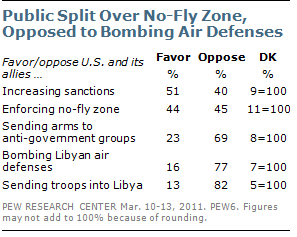A new poll shows little support for intervening in Libya.

A new poll from Pew Research confirms earlier polls from Rasmussen which showed that the American public doesn't support a military intervention in Libya:
The public by a wide margin says the United States does not have a responsibility to do something about the fighting between government forces and anti-government groups in Libya. And while opinion is divided over enforcing a no-fly zone over Libya, this view is undercut by the fact that Americans overwhelmingly oppose bombing Libyan military air defenses.The latest national survey by the Pew Research Center for the People & the Press, conducted March 10-13 among 1,001 adults, finds that 63% say the United States does not have a responsibility to act in Libya; fewer than half as many (27%) say the U.S. has this responsibility....
Reflecting the public's reluctance about U.S. involvement in Libya, barely half (51%) favor increasing economic and diplomatic sanctions against Libya. The public is divided over the possibility of enforcing a no-fly zone -- 44% favor this action while 45% are opposed. Yet just 16% favor bombing Libyan air defenses -- 77% oppose bombing the sites.
This is actually somewhat in line with yesterday's Washington Post/ABC news poll, which showed a slight majority in favor of a no-fly zone until they were asked about bombing Libyan air defenses, after which support for a no-fly zone drops. Pew also found that 69 percent of Americans have no interest in arming rebels and 82 percent do not want to send U.S. troops into Libya.
Meanwhile, Larison thinks we should follow Senator Lugar's advice and actually debate the merits of going to war with Libya in Congress:
As the vast majority of the public is against a Libyan war even in the form of a no-fly zone, it is hardly certain that Congress would authorize military action, much less take what is by now a very unusual step of formally declaring war. This is as it should be. War powers were reserved to Congress to prevent the executive from launching wars arbitrarily, and the failure of Congress to rein in presidential abuses in this area and the failure to insist on declarations of war before going to war have been at the heart of many of the most serious foreign policy blunders since WWII.



